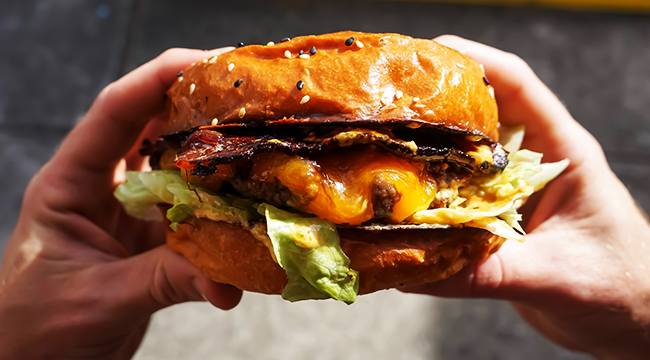
When you’re hungry and short on time, what kind of food do you reach for? For most of us, it depends on what’s around, and what’s around — if you look at your average workspace vending machine or take a walk around an American grocery store — is likely to be ultra-processed.
Potato chips, candy bars, sugary granola bars (almost the same thing), roasted-and-salted-to-hell nuts. Junk food, plain and simple.
The ubiquitousness of junk food in the U.S. has long been the focus of health groups and, yes, diet peddlers. Soda taxes and pushes to “eat clean” work two angles toward achieving the same goal: reducing our reliance on ultra-processed foods. They’re bad for you — for your wallet, for your waistline, for your well-being — these groups claim, and they’ve claimed it for years, despite a lack of hard evidence.
Until now. In recent months, new research has started to back up claims that processed foods are bad for you — in ways we never imagined before. What does the new research mean for your diet and well-being? We explain.
What is an “ultra-processed” food?
First things first: there’s a difference between minimally processed, processed, and ultra-processed foods. First coined in 2009 by researcher Carlos Monteiro, a Professor of Nutrition and Public Health at the University of Sao Paulo in Brazil, “ultra-processed” foods are part of a four-part Nova scale that classifies food based on their production.
The Nova scale is as follows:
- 1: Unprocessed or minimally processed foods, like eggs, the edible parts of plants, pasteurized milk or ground spices.
- 2: Processed culinary ingredients, such as oils or butters.
- 3: Processed foods, such as canned vegetables, fruits packed in syrup, fresh bread or cheese.
- 4: Ultra-processed food and drink products, such as soda, reconstituted meats (e.g. hot dogs), or frozen dinners.
To put it another way, according to Vox, “ultraprocessed foods are created in factories. They’re pumped full of chemicals and other additives for color, flavor, texture, and shelf life. This processing generally increases the flavor and caloric density of the foods, while stripping away the fiber, vitamins, and nutrients.”
And why does this matter to Americans in particular? Because we’re far too reliant on these foods.
According to a 2010 study on U.S. eating habits, which followed 9,317 participants for a year, “Ultra-processed foods comprised 57.9% of energy intake, and contributed 89.7% of the energy intake from added sugars.” In plain language: the average American gets more than half of their calories from ultra-processed foods — and much of that comes from added sugars.
Why is this a problem? Several studies that have come out in the last year can illuminate why this should worry you.
Diets high in ultra-processed foods are being linked with weight gain.
A recent study from the National Institutes of Health, which was published in May 2019, found a link between diets high in ultra-processed foods and weight gain. According to the press release,
“People eating ultra-processed foods ate more calories and gained more weight than when they ate a minimally processed diet. […] The difference occurred even though meals provided to the volunteers in both the ultra-processed and minimally processed diets had the same number of calories and macronutrients.”
The study only followed 20 participants, but the research was conducted in a highly controlled environment: 10 men and 10 women lived “in a designated facility for four weeks” where half the subjects were fed a diet comprised of ultra-processed foods and the other half were fed minimally processed foods. After two weeks, the groups’ diets were switched.
This means a few things: the assertion that “calories in, calories out” is all that matters might not be as bulletproof as some people thought. Rather, it seems that the kind of calories you’re consuming plays a bigger role in weight. Additionally, those who ate the ultra-processed diet tended to eat more than those on the minimally processed diet — to the tune of 500 calories per day. Interestingly, participants, when asked to rate the food, didn’t find their ultra-processed meals any better than their minimally processed meals.
Ultra-processed foods are linked to an increase in numerous health problems.
Weight isn’t the be-all and end-all of health, no matter what diet companies try to sell you. Rather, the recent NIH study on weight-gain functions as an indicator that these ultra-processed foods don’t jive with our bodies, no matter our sizes. And, in fact, as Michael Hobbes wrote for The Huffington Post:
Studies have found that anywhere from one-third to three-quarters of people classified as obese are metabolically healthy. They show no signs of elevated blood pressure, insulin resistance or high cholesterol. Meanwhile, about a quarter of non-overweight people are what epidemiologists call ‘the lean unhealthy.’ A 2016 study that followed participants for an average of 19 years found that unfit skinny people were twice as likely to get diabetes as fit fat people. Habits, no matter your size, are what really matter. Dozens of indicators, from vegetable consumption to regular exercise to grip strength, provide a better snapshot of someone’s health than looking at her from across a room.
And the research on the health consequences of ultra-processed food is starting to bear this out. Here’s how:
An increase in risk for heart disease.
Cardiovascular disease, according to the World Health Organization, is the number one cause of death around the world, accounting for one-third of global deaths each year. It’s also highly preventable by addressing underlying causes such as tobacco use or, you guessed it, diet.
A study from France, published in The BMJ last month, followed 109,159 participants 18 and older for an average period of five years, tracking their diets and health. They found that “intake of ultra-processed food was associated with a higher risk of overall cardiovascular disease, coronary heart disease risk, and cerebrovascular disease risk.” The results “remained statistically significant after adjustment for several markers of the nutritional quality of the diet” and holding for numerous variables.
This may have to do with the fact that ultra-processed foods are calorie-dense and nutrient-poor, but researchers found that the link to cardiovascular disease goes “[b]eyond nutritional composition”: “several compounds of ultra-processed foods that are neoformed during processing could also play a role in cardiovascular health.”
An increase in risk for certain types of cancer.
That same study from France also found a possible link between diets high in ultra-processed foods and certain types of cancer. According to a press release from The BMJ, “The results show that a 10% increase in the proportion of ultra–processed foods in the diet was associated with increases of 12% in the risk of overall cancer and 11% in the risk of breast cancer.”
Early death.
Perhaps this goes without saying, given the studies mentioned above, but even accounting for non-cancer and non-cardiovascular disease deaths, those with diets high in ultra-processed foods tend to be at higher risk for early death.
In a Spanish study, according to NBC News, “The researchers found that, compared with participants whose diets contained the least amount of ultra-processed food, participants whose diets contained the highest amounts had a 62 percent increased risk of premature death from any cause during the study period. This study also accounted for factors such as gender, age, physical activity, baseline BMI, and smoking history.”
A possible link to Autism Spectrum Disorder.
Finally, and most recently, though doctors don’t know what causes Autism Spectrum Disorder yet, a few recent studies have noted a connection between gut bacteria and autism — specifically certain food preservatives, including propionic acid, which is found in higher concentration in ASD individuals’ stool samples, is concerned. A 2017 study found that people with ASD have different gut microbiota compared to neurotypical individuals, and new research shows this may have something to do with certain preservatives used in ultra-processed foods.
Researchers at the University of Central Florida noticed that neural stem cells with high exposure to propionic acid a.k.a. PPA were more likely to become glial cells, which, though they “can support neuronal function” can also, if found in excess, “lead to inflammation in the brain and disrupt the connectivity between neurons.” Further, they noted that PPA “damaged the molecular pathways that normally enable neurons to send information to the rest of the body.”
While the body naturally produces some PPA in the gut, the research suggests that “eating processed foods likely to have high levels of PPA during pregnancy may increase PPA levels in the maternal gut, which could then transfer to the fetus.”
Why are processed foods so bad for us?

Scientists aren’t absolutely certain yet, but research is starting to indicate that “processed foods, with all their additives and sugar and lack of fiber, may be formulated in ways that disturb the gut microbiome, the trillions of diverse bacteria lining our intestines and colon,” according to Vox. “Those disturbances, in turn, may heighten the risk of chronic disease and encourage overeating.”
It’s essential to keep your gut microbiome healthy because the lion’s share of the bacteria there is good. Our guts help us digest food, yes, but they’re also essential for a functioning immune system. Disturb the gut, disturb your whole body.
Does this mean I need to cut out all processed foods?
Whenever possible, avoid ultra-processed foods. Eat fresh fruits and vegetables, unprocessed meats (ground beef instead of bologna), whole grains, raw nuts. That said, this advice comes with a caveat. Two caveats, really.
The first is this: food deserts and food insecurity are two very real problems in the U.S., disproportionately affecting low-income people. You cannot talk about eating well without talking about who gets to eat well. Inequality and nutrition go hand-in-hand, and the existence of food deserts (locations where fresh fruits and vegetables and other minimally processed foods are not readily available and/or affordable) means that it’s not possible for many low-income Americans to avoid ultra-processed foods, which are both cheap and readily available. In order to change that, we need to change the entire food system by doing things like supporting the Healthy Food Financing Initiative and nonprofits like The Food Trust, which runs farmers’ markets in food deserts across the country.
Secondly, if you do have the means to avoid ultra-processed foods, be gentle with yourself. While you should seriously limit the amount of processed foods in your diet, cutting them out completely isn’t necessary. If you reach for a bag of chips every once in a while, it’s not the end of the world. Taking too severe of an approach to food could lead down the path to disordered eating, especially if you start equating some foods as bad or even evil. Research shows that not only does dieting not work, with research dating back 50 years showing that “95 to 98 percent of attempts to lose weight fail” but that it’s a slippery slope from cutting out entire groups of food to developing disordered eating.
There’s no inherent moral quality to food, and you’re not a bad person if you occasionally eat a bag of Skittles. Advice like “eat clean” comes loaded with baggage, coded language about the moral failings of people not able to willing to cut out “dirty” foods, a reality that is all-too-familiar to the approximately 10 percent of Americans who suffer or have suffered from eating disorders.
At the end of the day, food should be enjoyed. Just, perhaps, a little more thoughtfully.






